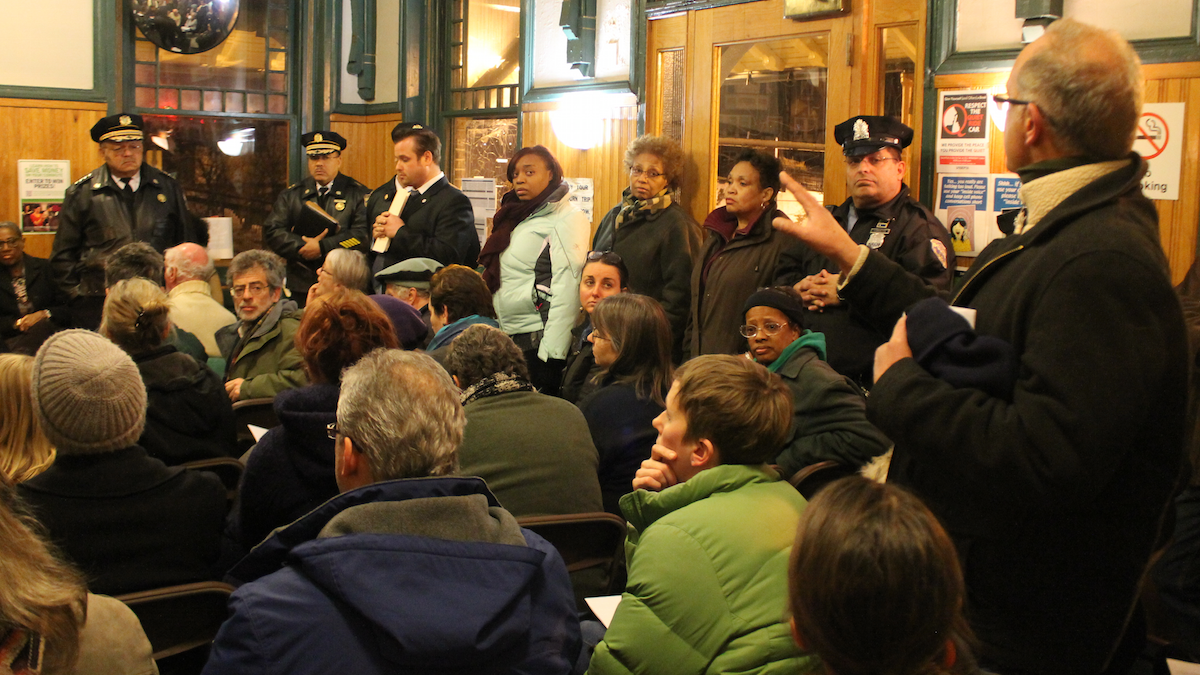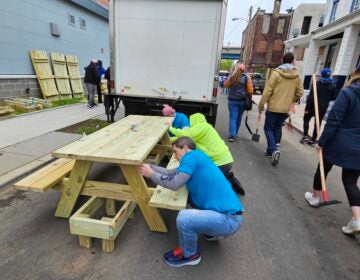Police commissioner: ‘We ain’t opening a mini-station’ in southwest Germantown

Police Commissioner Charles Ramsey fields pointed questions from residents about police response times in their community. (Matthew Grady/for NewsWorks)
The Commissioner’s message was clear: No.
For about a year, community leaders in southwest Germantown have been hinting at establishing a police mini-station in their neighborhood.
Their feeling was that with a constant and visible police presence, crime and quality-of-life violations that plague certain sections of the community would begin to ebb.
“We’ve tried everything, and nothing has worked,” said Lisa Hopkins, leader of the Northwest Neighbors of Germantown civic group.
‘Not a viable option’
At a packed meeting held Wednesday evening at the Queen Lane regional rail station – the proposed location for the mini-station – leaders and residents made their pitch directly to Philadelphia Police Commissioner Charles Ramsey.
His response to neighbors was unequivocal: “This is not a viable option for us.”
Beyond a lack of financial resources and available personnel for the proposal, Ramsey related a very practical reason to oppose the idea: Every neighborhood in Philadelphia would want one.
When asked about the existence of South Street mini-station, Ramsey explained that the detachment is there specifically to handle the large numbers of visitors who populate the street on weekends and during special events.
He also referenced the dilapidated condition of many buildings currently owned by the department, suggesting that, “the last thing I need is another piece of crap that I gotta put my officers in.”
Engaging the neighborhood
Ramsey was supported in his position by Chief Thomas Nestel, head of the SEPTA Transit Police, who was also present at the meeting.
“Mini-stations are where cops rest, not work,” said Nestel. “I like cops out walking around on a beat, addressing the problems, not sitting on the second floor of a building.”
While preferring to place his resources where they would serve as visible deterrents, Nestel said that any strategies developed between neighbors and local police would be supported by the Transit Police.
Ramsey said he considers the strong working relationships his department enjoys with SEPTA, along with other city and regional agencies, as being a “force multiplier.”
“Mini-stations and buildings don’t do that,” he observed. “People do that.”
Other options
With the mini-station being a non-starter, Ramsey suggested residents and police explore other options to combat street crime.
Capt. Michael Craighead, commanding officer of the 39th District, said that he will use a combination of uniform patrol officers, plain-clothes surveillance teams and bike cops to address crime at the tactical level in the neighborhood.
Asked about the possibility of installing surveillance cameras, Ramsey affirmed his belief in their effectiveness noting their assistance in solving a number of crimes.
Deputy Commissioner Kevin Bethel explained that 1,800 cameras currently link into the department’s Real Time Crime Center, but because of this volume, each camera cannot be monitored exclusively.
In addition, there are technical limitations to the cameras: Many neighborhoods are not wired for fiber optic data transmission, and wireless systems have not proven to be effective for law enforcement use.
“We will help to push cameras,” Ramsey said.
To coordinate various efforts, John Cerrone from the mayor’s office said that southwest Germantown would be a good candidate for Philly Rising, an initiative that brings together city agencies, residents, the PPD and outside partners to address chronic crime and quality-of-life concerns in communities.
Memories of mini-stations past
Southwest Germantown resident Irv Ackelsberg recalled a mini-station that once existed during the 1990s to combat problems near the intersection of Wissahickon Ave. and Manheim St.
“It was not our solution, but what did happen was the mobilization of people,” he noted. “Getting that station was a symbol of the commitment that we all had, that we were going to take back Wissahickon and Manheim.”
Acklesberg suggested that the strong turnout at the meeting could be harnessed, a sentiment that the police commissioner seconded.
“We’ll get this problem solved,” said Ramsey. “But, I’m telling you now, we ain’t opening a mini-station.”
WHYY is your source for fact-based, in-depth journalism and information. As a nonprofit organization, we rely on financial support from readers like you. Please give today.




